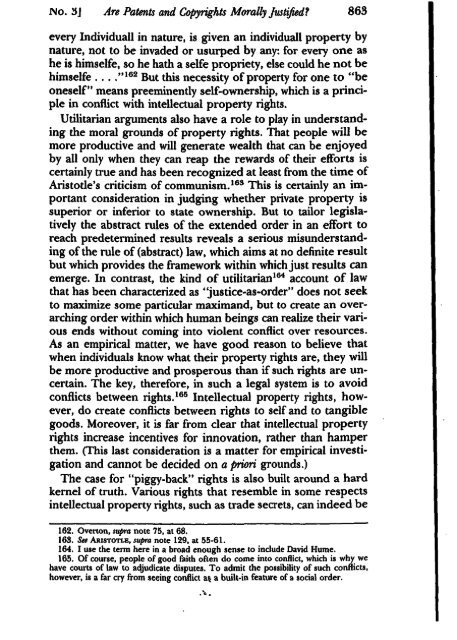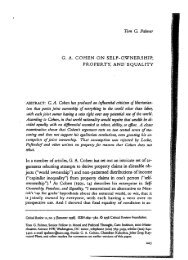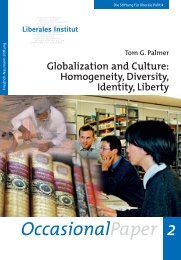Are Patents and Copyrights Morally Justified? - Tom G. Palmer
Are Patents and Copyrights Morally Justified? - Tom G. Palmer
Are Patents and Copyrights Morally Justified? - Tom G. Palmer
You also want an ePaper? Increase the reach of your titles
YUMPU automatically turns print PDFs into web optimized ePapers that Google loves.
No. ~SJ <strong>Are</strong> <strong>Patents</strong> <strong>and</strong> <strong>Copyrights</strong> <strong>Morally</strong> Just!fled? 863<br />
every Individuall in nature, is given an individual! property by<br />
nature, not to be invaded or usurped by any: for every one as<br />
he is himselfe, so he hath a selfe propriety, else could he not be<br />
himselfe. , ~ But this necessity ofproperty for one to “be<br />
oneself” means preeminently self-ownership, which is a principle<br />
in conflict with intellectual property rights.<br />
Utilitarian arguments also have a role to play in underst<strong>and</strong>ing<br />
the moral grounds of property rights. That people will be<br />
more productive <strong>and</strong> will generate wealth that can be enjoyed<br />
by all only when they can reap the rewards of their efforts is<br />
certainly true <strong>and</strong> has been recognized at least from the time of<br />
Aristotle’s criticism of communism. 163 This is certainly an important<br />
consideration in judging whether private property is<br />
superior or inferior to state ownership. But to tailor legislatively<br />
the abstract rules of the extended order in an effort to<br />
reach predetermined results reveals a serious misunderst<strong>and</strong>ing<br />
ofthe rule of(abstract) law, which aims at no definite result<br />
but which provides the framework within whichjust results can<br />
emerge. In contrast, the kind of utilitarian’~account of law<br />
that has been characterized as “justice-as-order” does not seek<br />
to maximize some particular maxim<strong>and</strong>, but to create an overarching<br />
order within which human beings can realize their various<br />
ends without coming into violent conflict over resources.<br />
As an empirical matter, we have good reason to believe that<br />
when individuals know what their property rights are, they will<br />
be more productive <strong>and</strong> prosperous than if such rights are uncertain,<br />
The key, therefore, in such a legal system is to avoid<br />
conflicts between rights.’ 65 Intellectual property rights, however,<br />
do create conflicts between rights to self <strong>and</strong> to tangible<br />
goods. Moreover, it is far from clear that intellectual property<br />
rights increase incentives for innovation, rather than hamper<br />
them. (This last consideration is a matter for empirical investigation<br />
<strong>and</strong> cannot be decided on a priori grounds.)<br />
The case for “piggy-back” rights is also built around a hard<br />
kernel of truth. Various rights that resemble in some respects<br />
intellectual property rights, such as trade secrets, can indeed be<br />
162. Overion, sn/wa note 75, at 68.<br />
163. See ARIs<strong>Tom</strong>E, sn/wa note 129, at 55-6L<br />
164. I use the term here in abroad enough sense to include David Hume.<br />
165. Of course, people of good faith often do come into conflict, which is why we<br />
have courts of law to adjudicate disputes. To admit the possibility of such conflicts,<br />
however, is a far cry from seeing conflict a~abuilt-in feature of a social order.<br />
4..











